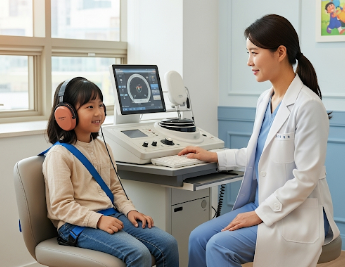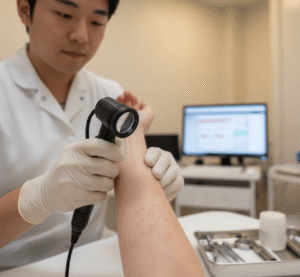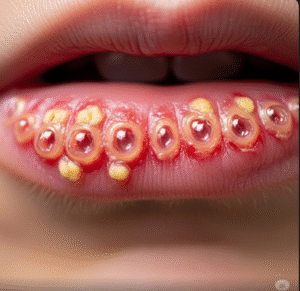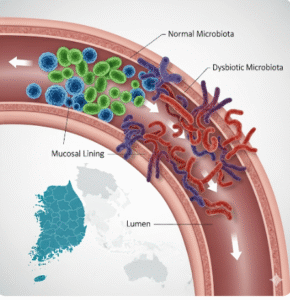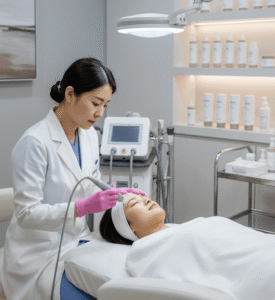Overview
Hearing tests, also known as audiological evaluations, are essential for diagnosing hearing loss, ear disorders, and balance problems. They help identify the type and severity of hearing impairment, allowing early intervention and proper treatment.
South Korea offers world-class audiology services, including advanced diagnostic tools, pediatric and adult hearing assessments, and specialized clinics. Hearing tests are commonly performed in ENT hospitals, specialized audiology centers, and children’s hospitals.
What is a Hearing Test?
A hearing test is a non-invasive assessment of a person’s ability to detect sounds at different pitches and volumes. It helps determine:
- Degree of hearing loss (mild, moderate, severe, or profound)
- Type of hearing loss → conductive, sensorineural, or mixed
- Ear health and function → middle ear, cochlea, and auditory nerve
- Need for hearing aids or cochlear implants
Common types of hearing tests include:
- Pure Tone Audiometry (PTA) → Measures the softest sounds a person can hear
- Speech Audiometry → Tests clarity of understanding spoken words
- Tympanometry → Evaluates middle ear function
- Otoacoustic Emissions (OAE) → Checks cochlear function, often for infants
- Auditory Brainstem Response (ABR) → Tests nerve pathways for newborns or complex cases
What are the Benefits?
- Early detection of hearing loss to prevent further complications
- Accurate diagnosis for children and adults
- Improved communication and quality of life
- Tailored treatment planning → hearing aids, cochlear implants, or medical interventions
- Monitoring of progressive or age-related hearing loss
- Safe, painless, and non-invasive procedure
Procedure Details
1) How should I prepare for Hearing Tests?
- Schedule an appointment → Especially for children or older adults
- Medical history → Bring information about ear infections, noise exposure, medications, or family history of hearing loss
- Avoid loud noise exposure 24 hours prior to testing
- Remove earwax or foreign objects → ENT may clean ear canal if needed
- Relax and follow instructions → For accurate test results
2) What happens during the procedure Hearing Tests?
- Initial assessment → Interview about hearing concerns and symptoms
- Pure Tone Audiometry (PTA) → Earphones deliver tones at different frequencies and volumes; patient signals when they hear sound
- Speech Audiometry → Patient repeats or identifies words to test clarity
- Tympanometry → Small probe measures middle ear pressure and eardrum movement
- OAE & ABR tests → Special sensors or electrodes used, especially for infants or complex cases
- Duration → Usually 30–60 minutes depending on the type and complexity of tests
3) What happens after a Hearing Test?
- Review results with audiologist or ENT specialist
- Diagnosis → Degree and type of hearing loss identified
- Treatment planning → May include hearing aids, medical treatment, surgery, or cochlear implants
- Follow-up → Regular monitoring for progressive hearing loss
- Education → Advice on protecting hearing and improving communication
Risks / Benefits
Risks
- ➤ Minimal risk; procedure is non-invasive and painless
- ➤ Temporary discomfort from earphones or probes
- ➤ Rare anxiety in young children or patients with sensory sensitivities
Benefits
- ➤ Early detection and intervention for hearing loss
- ➤ Accurate diagnosis to guide treatment
- ➤ Improved quality of life with hearing solutions
- ➤ Monitoring for progressive conditions like age-related hearing loss or noise-induced hearing loss
Recovery and Outlook
- No downtime → Patients can resume normal activities immediately
- Early treatment → Hearing aids, surgery, or cochlear implants can be planned based on results
- Children → Early intervention can improve speech, language, and cognitive development
- Adults → Prevents further hearing deterioration and enhances communication
- Follow-up → Regular testing ensures hearing is maintained or improved
South Korea provides advanced audiology centers with pediatric specialists and adult audiologists, ensuring accurate diagnosis and customized treatment plans.
When To Call the Doctor
- ⚠️ Sudden hearing loss
- ⚠️ Persistent ringing or tinnitus
- ⚠️ Ear pain, discharge, or swelling
- ⚠️ Dizziness or balance problems
- ⚠️ Worsening hearing in one or both ears
Early consultation is crucial for effective intervention and preventing permanent damage.
Best Korea Option / Process
South Korea is a preferred destination for hearing tests and audiological care due to:
- Advanced audiology technology including PTA, OAE, ABR, and tympanometry
- Pediatric and adult specialists with extensive experience
- Comprehensive ENT centers for medical and surgical treatment if needed
- Affordable and high-quality care for international patients
- English-speaking staff in leading hospitals and clinics
Top Hospitals and Clinics for Hearing Tests in Korea:
- Seoul National University Hospital (SNUH) – Full audiology and ENT services
- Asan Medical Center, Seoul – Advanced diagnostics for children and adults
- Samsung Medical Center – Specialized hearing and balance clinics
- Yonsei Severance Hospital – Comprehensive ENT and audiology care
👉 For individuals with hearing concerns or routine screening needs, Hearing Tests in Korea provide accurate, safe, and comprehensive evaluation to support early diagnosis and effective treatment.

